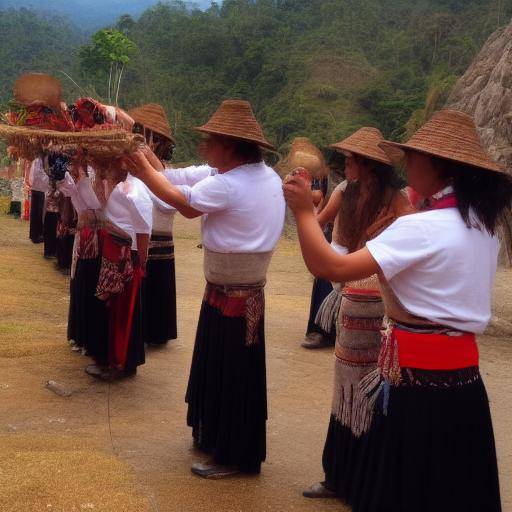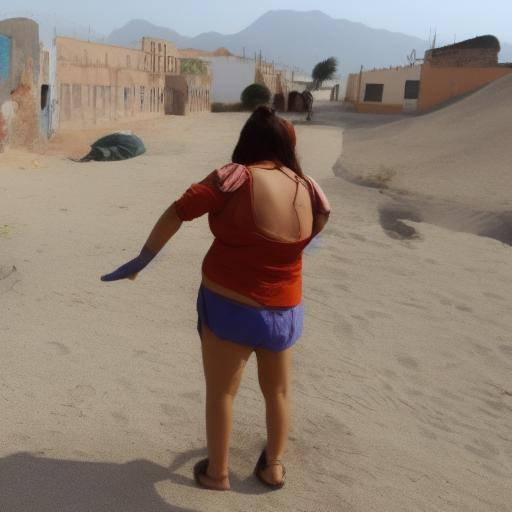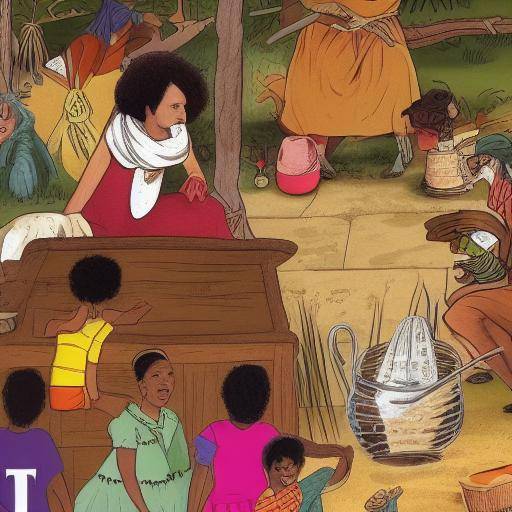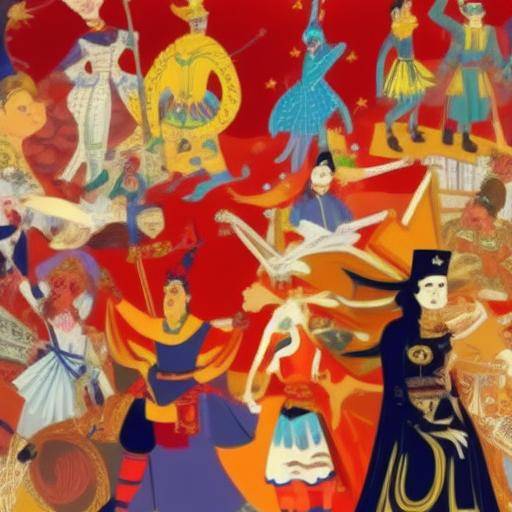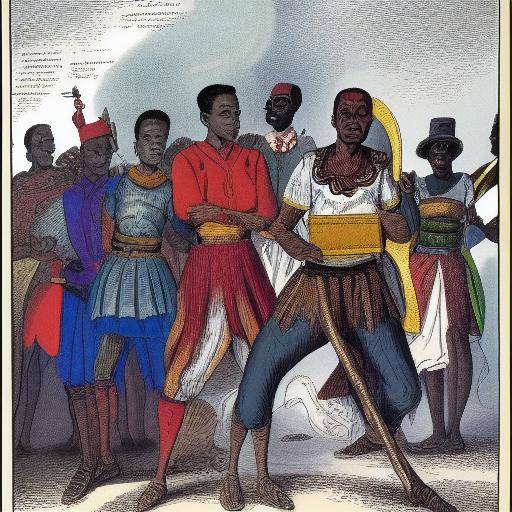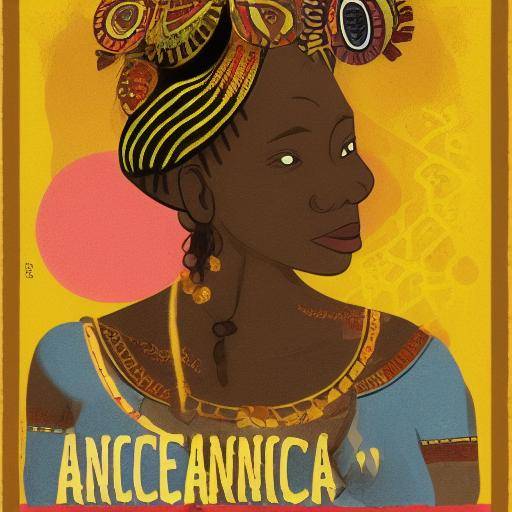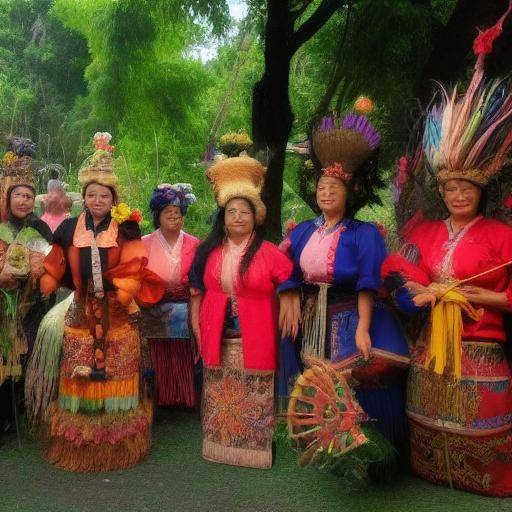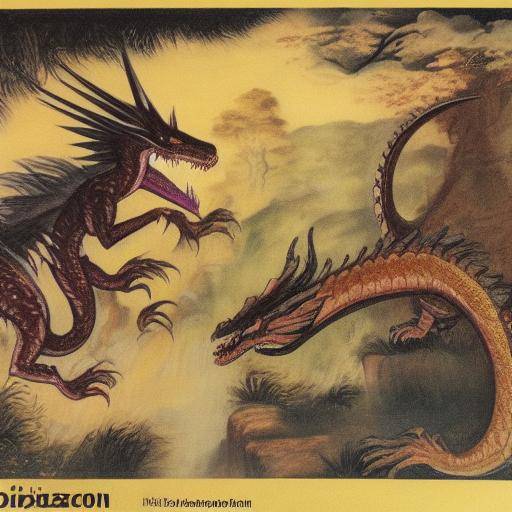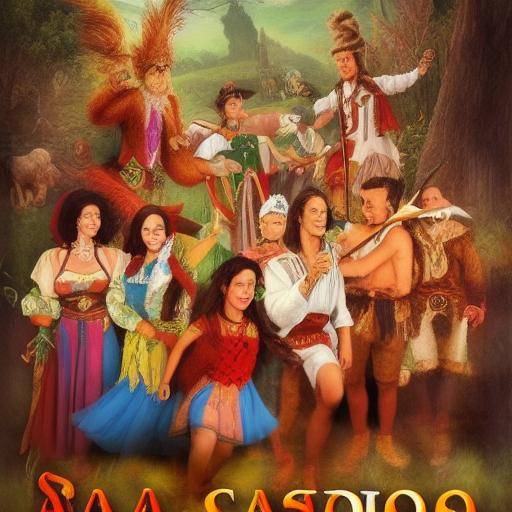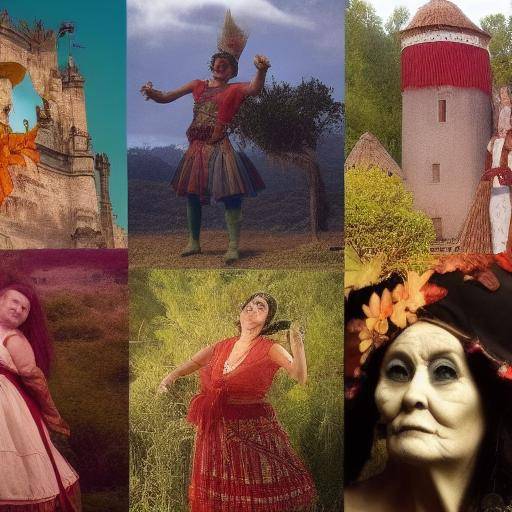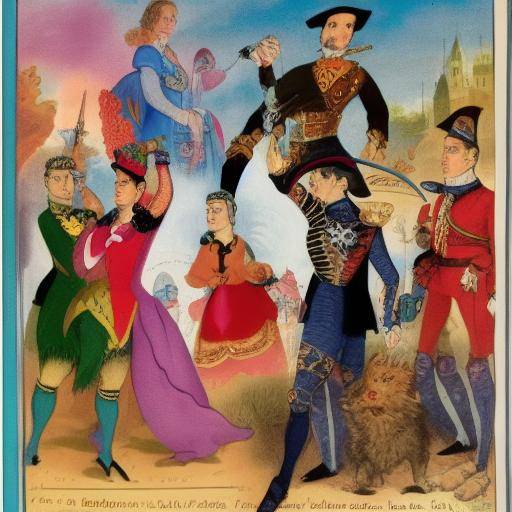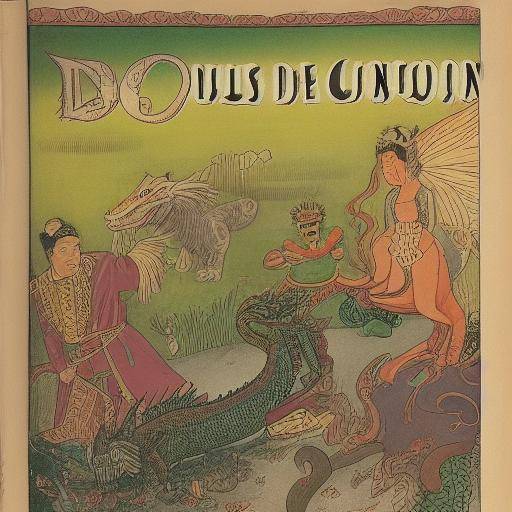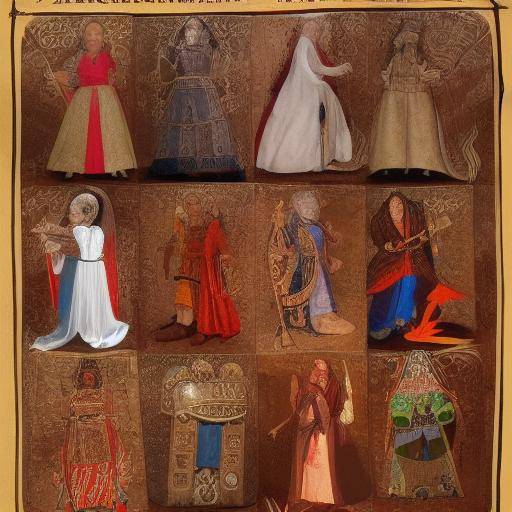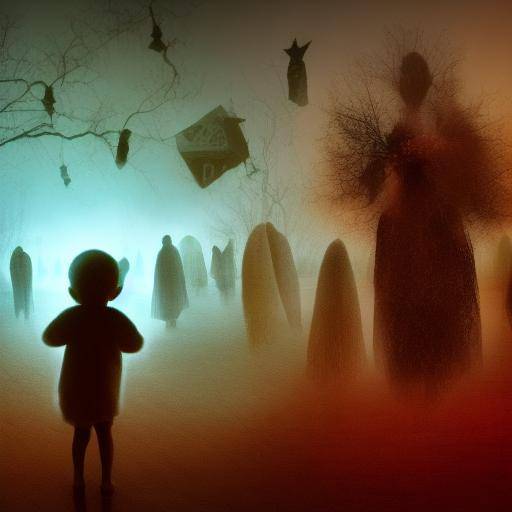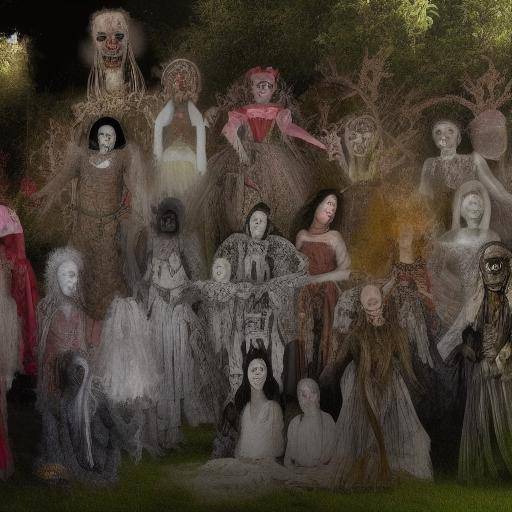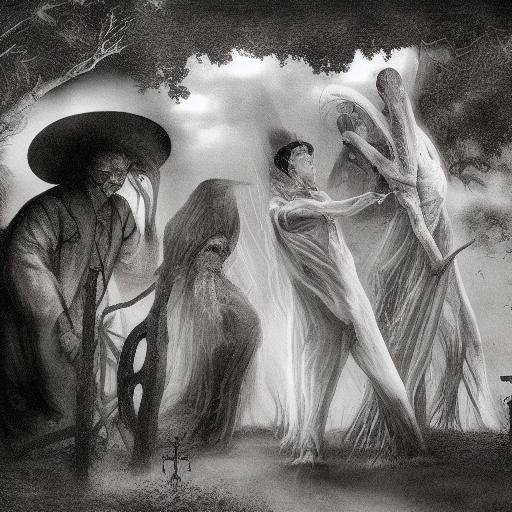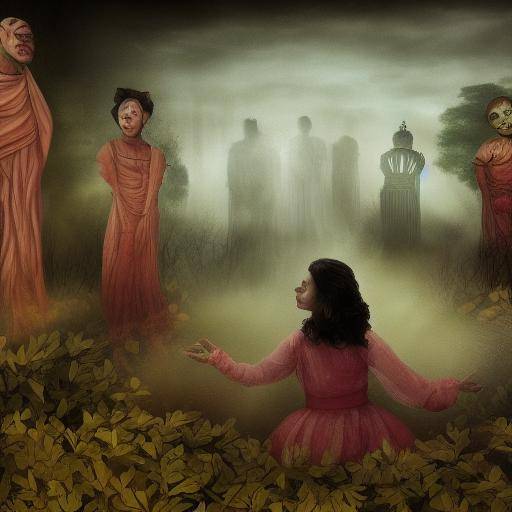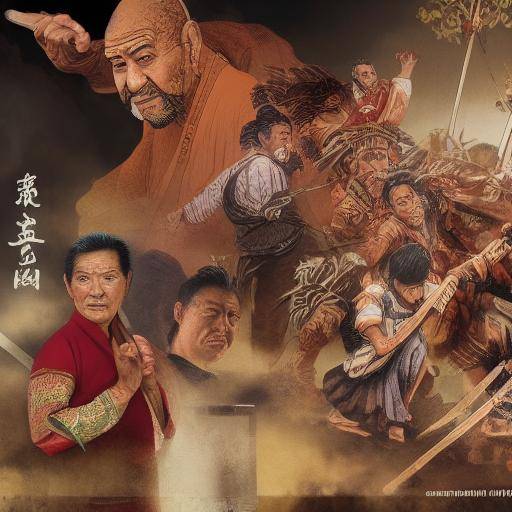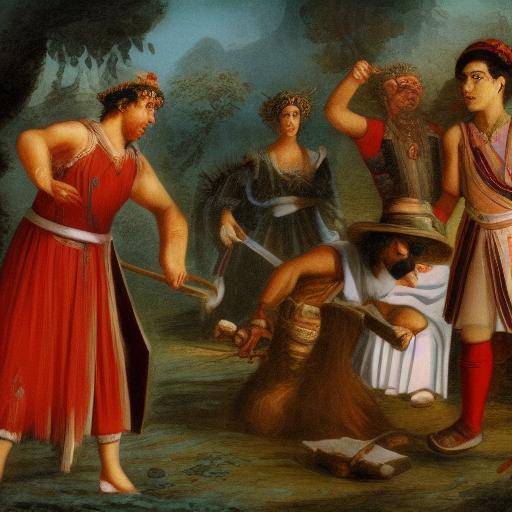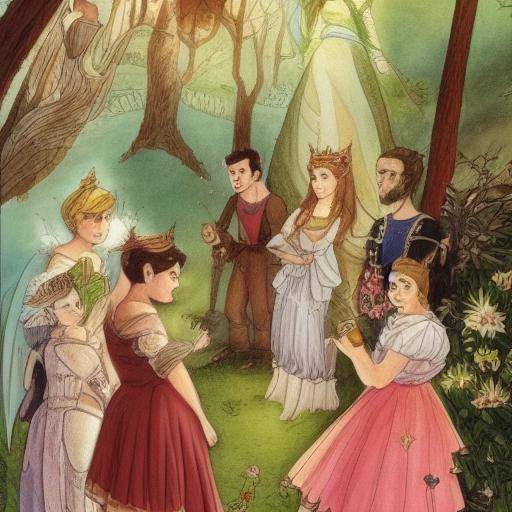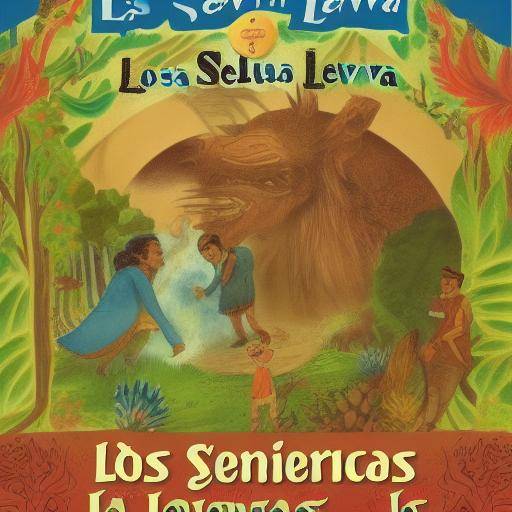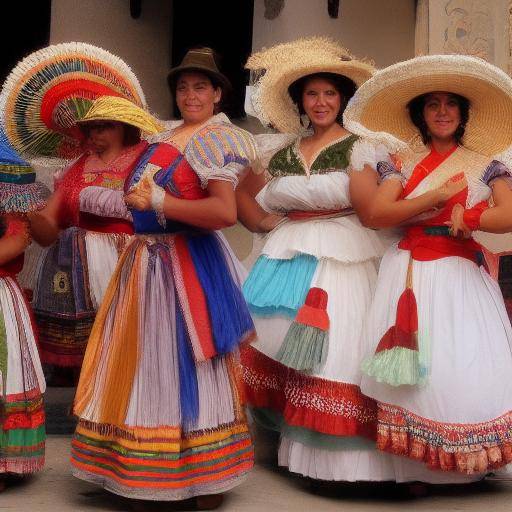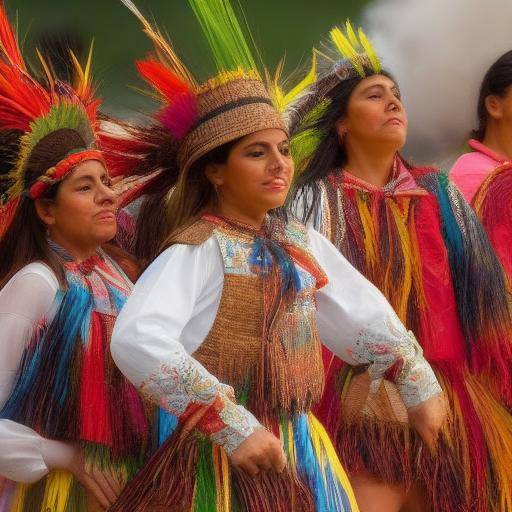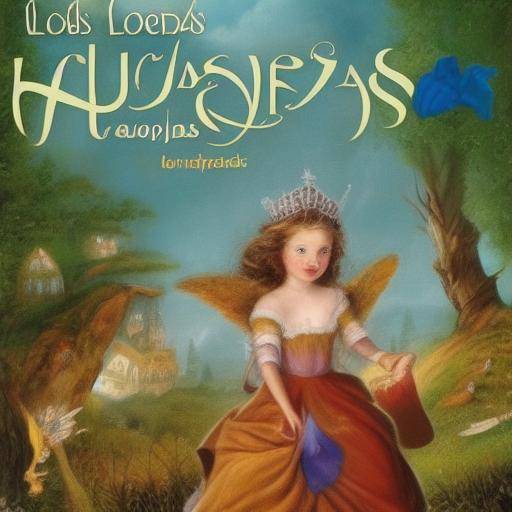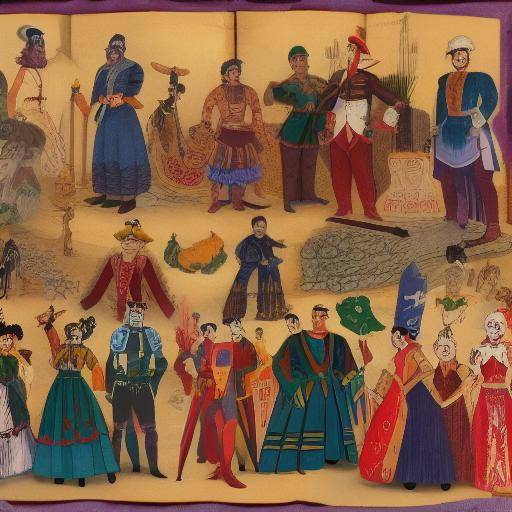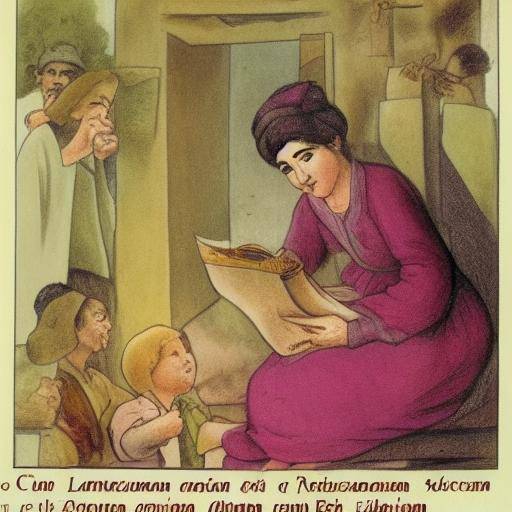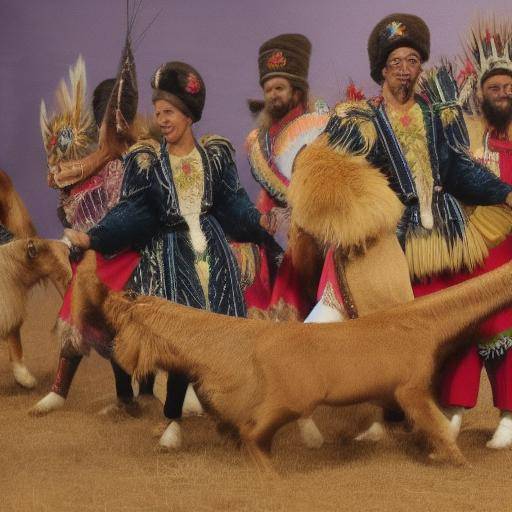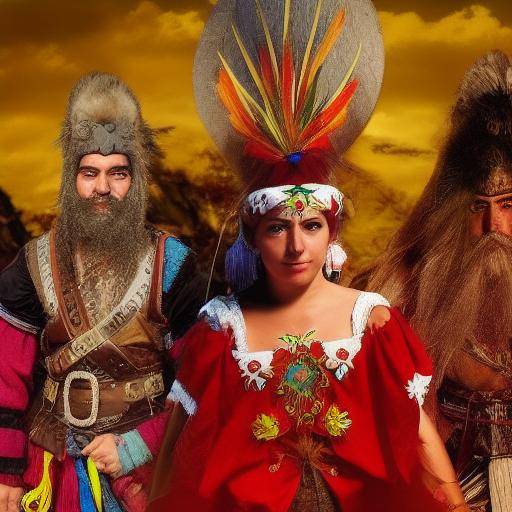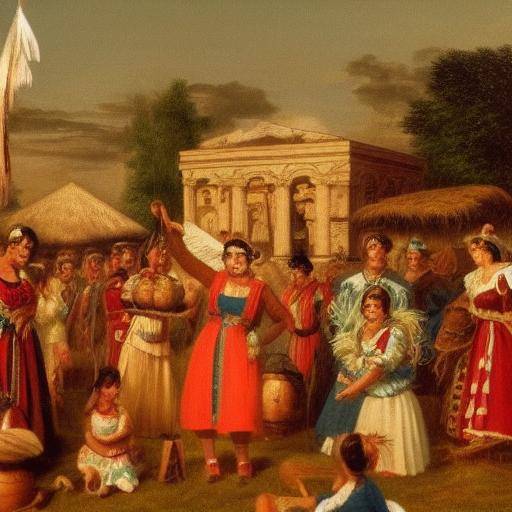
Latin American folklore is a cultural treasure that stands out for the wealth of their stories, many of which are rooted in ancestral beliefs. The stories of Latin American folklore offer a unique window to the traditions, customs and spiritual connection of peoples with their ancestors. In this article, we will explore the power of the ancestors through the fascinating stories of Latin American folklore, revealing its relevance, meaning and beauty. Join us on this journey through the cultural roots of Latin America!
Introduction
In Latin America, folklore is a living expression that reflects the identity of its peoples. Through folklore, we transmit the beliefs, myths, legends and traditions of generation to generation, thus preserving the collective memory of the communities. One of the most outstanding elements of this folklore is the omnipresent presence of the ancestors, whose legacy endures over time.
In this article, we will explore how the stories of Latin American folklore illustrate influence, power and reverence towards the ancestors. From the legends of gods and heroes to mythical accounts that narrate the interaction between the earthly and spiritual world, we will discover how these stories convey deep respect for the ancestors and their legacy.
History and Background
Origenes del Folklore Latinoamericano
Latin American folklore finds its roots in pre-Columbian indigenous cultures, who through their oral traditions, rituals and artistic expressions, shaped the bases of folklore. With the arrival of the European conquerors, there was a cultural syncretism that further enriched the folkloric acquis of the region, merging indigenous beliefs with European traditions.
The stories of Latin American folklore reflect the multicultural heritage of the continent, incorporating elements of indigenous mythology, European legends and African narratives that came with slavery. This crucible of influences has endowed Latin American folklore with a unique diversity and depth in the world.
The Importance of Ancestors in Folklore
The ancestors occupy a central place in Latin American folklore, being venerated as spiritual guides and guardians of tradition. The stories of folklore often portray ancestors as wise and benevolent figures that ensure the well-being of their descendants, providing moral teachings, protection and advice through stories transmitted from generation to generation.
The celebrations and rituals dedicated to honoring the ancestors, such as the Day of the Dead in Mexico, the Feast of All Saints in several Latin American countries or the ceremonies of thanks to the Pachamama in the Andes, reflect the deep connection between folklore and the veneration of the ancestors.
Evolution of the Latin American Folklore
Throughout history, Latin American folklore has evolved in response to social, political and cultural changes. Traditional stories have been adapted to reflect contemporary realities, addressing relevant issues such as the struggle for social justice, resistance to oppression, the defense of the environment and the preservation of cultural identity.
The influence of ancestors in folklore is manifested in the reinterpretation of their legacy, as well as in the creation of new stories that reflect the continued relevance of ancestral wisdom in everyday life.
Anecdotes and Emblematic Cases
The Legend of El Dorado: Behind the Footsteps of the Lost Treasure
The legend of El Dorado, originally from the Andes region, has endured over the centuries as a symbol of wealth and mystery. This narrative, wrapped in the search for the legendary city of gold, has not only captivated the popular imagination, but it has also served as a reminder of the fascination that awakens the ancestral stories in the collective psyche.
La Llorona: Between lament and redemption
The tragic story of La Llorona, a female figure whose tearing tears are heard at night, is an iconic example of how Latin American folklore stories reflect universal fears, longings and archetypes. This legend, present in various regions of Latin America, addresses issues of remorse, loss and redemption, offering a window to the complex relationship between life and death in the Latin worldview.
Detailed Analysis
Contemporary Relevance of Folklore Stories
The value of the stories of Latin American folklore transcends the purely folkloric, impacting popular culture, arts, literature and collective identity. The reverence towards the ancestors, manifested through often mystical and profound narratives, resonates in various fields, from cinema and music to fashion and gastronomy.
The stories of Latin American folklore offer the world a unique vision of human narratives, as well as the opportunity to appreciate the cultural and spiritual diversity of the region.
Challenges in Folklore Transmission
Despite its relevance, Latin American folklore faces challenges for its preservation and dissemination. Globalization, technological advancement and urbanization have generated changes in the lifestyle and the cosmovision of Latin American societies, affecting the oral transmission of ancestral stories.
In addition, lack of recognition and protection at the institutional level threatens the authenticity and vitality of folklore. It is crucial to create strategies that encourage the assessment, safeguard and diffusion of Latin American folklore to ensure its continuity and relevance in the 21st century.
Diverse Perspectives on Latin American Folklore
The stories of Latin American folklore have been analysed from various disciplines, such as anthropology, sociology, history and literature, which have enriched the understanding and appreciation of folklore. These multidisciplinary perspectives have helped unravel the multiple layers of meaning, symbolism and contemporary relevance present in folklore stories.
The recognition of Latin American folklore as the immaterial heritage of humanity by UNESCO has marked a significant milestone in the promotion and preservation of these cultural expressions.
Practices and Best Practices
Latin American folklore, through its ancestral stories, serves as a source of inspiration in various areas, such as cultural tourism, education, the promotion of diversity and the promotion of identity pride. The inclusion of folkloric elements in contemporary practices such as design, gastronomy and fashion has contributed to its global dissemination and appreciation.
In addition, the promotion of oral narrative and the intergenerational transmission of ancestral stories constitute essential practices for keeping these cultural expressions alive.
Comparative analysis
The stories of Latin American folklore share certain similarities with other folklore traditions, such as those of Europe, Asia and Africa, demonstrating the universality of the motifs and archetypes present in folklore. However, the uniqueness of Latin American folklore lies in its deep connection with nature, spirituality and the mestizo cosmovision that distinguishes it from other traditions.
The diversity and wealth of Latin American folklore constitute a valuable cultural legacy that deserves to be recognized and appreciated globally.
Practical Tips and Recommendations
- Explore traditional holidays: Participate in popular holidays such as the Carnival of Oruro in Bolivia, the Festival of Candelaria in Peru or the Holy Week in Guatemala to experience the stories of Latin American folklore firsthand.
- Support local artists and craftsmen: Buy works of art, crafts and literature that reflect the traditions of Latin American folklore, thus contributing to the preservation and dissemination of these cultural expressions.
- Encourage oral narrative: Organize storytelling sessions in schools, libraries or communities to share the stories of Latin American folklore with new generations, thus promoting their continuity and appreciation.
Industrial Perspectives and Expert Reviews
Interview with Dr. Ana María Martínez (Antropóloga)
"Latin American folklore represents a living testimony of the creativity and worldview of the peoples of the region. Through their stories, fundamental aspects of collective identity and memory are revealed, rooting communities in their cultural roots.", says Dr. Martinez.
Future Trends and Predictions
Latin American folklore is expected to awaken a growing interest at the global level, not only as a cultural expression, but also as a source of inspiration for various artistic expressions and sustainable development projects. The promotion of responsible and respectful tourism with local communities and their traditions will contribute to the assessment and preservation of folklore.
Conclusions
In conclusion, the stories of Latin American folklore constitute an invaluable cultural heritage that reflects deep reverence towards the ancestors, the connection with the nature and diversity of the cultures of the region. These stories offer a unique window to the spiritual, emotional and intellectual wealth of Latin America, inviting everyone to immerse themselves in their magic and meaning.
As we enter the twenty-first century, the preservation and diffusion of Latin American folklore acquire a growing importance, and its recognition and appreciation at the global level as a cultural legacy of humanity is crucial.
Frequently asked questions
What is the importance of Latin American folklore stories today?
The stories of Latin American folklore are fundamental to understanding the identity, the worldview and the history of the peoples of the region. In addition, they offer an incomparable cultural wealth that enriches the intangible heritage of humanity.
How can the stories of Latin American folklore be preserved and disseminated?
The preservation and dissemination of Latin American folklore can be achieved through initiatives that value their importance, such as inclusion in educational programs, support for local artists and artisans, the promotion of cultural tourism and the documentation of traditions.
What is the role of ancestors in the stories of Latin American folklore?
The ancestors occupy a central place in Latin American folklore as spiritual guides and guardians of tradition. His moral teachings, wisdom and protection are transmitted through histories, keeping his influence alive in everyday life.
How does Latin American folklore relate to the cultural identity of the region?
Latin American folklore is a fundamental manifestation of the cultural identity of the region, reflecting the ethnic, historical and social diversity of its peoples. Through their stories, the beliefs, values and traditions of each community are preserved and transmitted.
Are the stories of Latin American folklore exclusive to certain regions or extend to the whole continent?
The stories of Latin American folklore cover the entire continent, with each region bearing its own collection of stories, myths and legends. The diversity of these folk expressions is a reflection of the rich cultural heritage of Latin America.
What is the impact of Latin American folklore on contemporary arts and literature?
The folklore The Power of the Ancestors: Stories of the Latin American Folklore
Latin American folklore is a cultural treasure that stands out for the wealth of their stories, rooted in ancestral beliefs. The stories of Latin American folklore offer a unique window to the traditions, customs and spiritual connection of peoples with their ancestors. Throughout this journey, we will explore the power of the ancestors through the stories of Latin American folklore, revealing its relevance, meaning and beauty.
Introduction
Latin American folklore is a living expression that reflects the identity of its peoples. Through folklore, we transmit the beliefs, myths, legends and traditions of generation to generation, thus preserving the collective memory of the communities. One of the highlights of this folklore is the omnipresent presence of the ancestors, whose legacy endures over time. In this article, we will explore how the stories of Latin American folklore illustrate influence, power and reverence towards the ancestors. From the legends of gods and heroes to mythical accounts that narrate the interaction between the earthly and spiritual world, we will discover how these stories convey deep respect for the ancestors and their legacy.
Origenes del Folklore Latinoamericano
Latin American folklore finds its roots in pre-Columbian indigenous cultures, who through their oral traditions, rituals and artistic expressions, shaped the bases of folklore. With the arrival of the European conquerors, there was a cultural syncretism that further enriched the folkloric acquis of the region, merging indigenous beliefs with European traditions. The stories of Latin American folklore reflect the multicultural heritage of the continent, incorporating elements of indigenous mythology, European legends and African narratives that came with slavery.
The stories of Latin American folklore reflect the multicultural heritage of the continent, incorporating elements of indigenous mythology, European legends and African narratives that came with slavery. This crucible of influences has endowed Latin American folklore with a unique diversity and depth in the world.
The Importance of Ancestors in Folklore
The ancestors occupy a central place in Latin American folklore, being venerated as spiritual guides and guardians of tradition. The stories of folklore often portray ancestors as wise and benevolent figures that ensure the well-being of their descendants, providing moral teachings, protection and advice through stories transmitted from generation to generation. The celebrations and rituals dedicated to honoring the ancestors, such as the Day of the Dead in Mexico, the Feast of All Saints in several Latin American countries or the ceremonies of thanks to the Pachamama in the Andes, reflect the deep connection between folklore and the veneration of the ancestors.
Evolution of the Latin American Folklore
Throughout history, Latin American folklore has evolved in response to social, political and cultural changes. Traditional stories have been adapted to reflect contemporary realities, addressing relevant issues such as the struggle for social justice, resistance to oppression, the defense of the environment and the preservation of cultural identity. The influence of ancestors in folklore is manifested in the reinterpretation of their legacy, as well as in the creation of new stories that reflect the continued relevance of ancestral wisdom in everyday life.
Anecdotes and Emblematic Cases
The legend of El Dorado, originally from the Andes region, has endured over the centuries as a symbol of wealth and mystery. This narrative has not only captivated the popular imagination, but also served as a reminder of the fascination that awakens the ancestral stories in the collective psyche. Another emblematic story is that of La Llorona, a female figure whose tearing tears are heard at night. This legend, present in various regions of Latin America, addresses issues of remorse, loss and redemption, offering a window to the complex relationship between life and death in the Latin worldview.
Contemporary Relevance of Folklore Stories
The value of the stories of Latin American folklore transcends the purely folkloric, impacting popular culture, arts, literature and collective identity. The reverence towards the ancestors, manifested through often mystical and profound narratives, resonates in various fields, from cinema and music to fashion and gastronomy.
Despite its relevance, Latin American folklore faces challenges for its preservation and dissemination. Globalization, technological advancement and urbanization have generated changes in the lifestyle and the cosmovision of Latin American societies, affecting the oral transmission of ancestral stories. In addition, lack of recognition and protection at the institutional level threatens the authenticity and vitality of folklore. It is crucial to create strategies that encourage the assessment, safeguard and diffusion of Latin American folklore to ensure its continuity and relevance in the 21st century.
The stories of Latin American folklore have been analysed from various disciplines, such as anthropology, sociology, history and literature, which have enriched the understanding and appreciation of folklore. These multidisciplinary perspectives have helped unravel the multiple layers of meaning, symbolism and contemporary relevance present in folklore stories.
Practices and Best Practices
Latin American folklore, through its ancestral stories, serves as a source of inspiration in various areas, such as cultural tourism, education, the promotion of diversity and the promotion of identity pride. The promotion of oral narrative and the intergenerational transmission of ancestral stories constitute essential practices to keep these cultural expressions alive.
Comparative Analysis and Culinary Delights
The stories of Latin American folklore share certain similarities with other folklore traditions, demonstrating the universality of the motifs and archetypes present in folklore. However, the uniqueness of Latin American folklore lies in its deep connection with nature, spirituality and the mestizo cosmovision that distinguishes it from other traditions.
Practical Tips and Recommendations
- Explore traditional holidays: Participate in popular holidays such as the Carnival of Oruro in Bolivia, the Festival of Candelaria in Peru or the Holy Week in Guatemala to experience the stories of Latin American folklore firsthand.
- Support local artists and craftsmen: Buy works of art, crafts and literature that reflect the traditions of Latin American folklore, thus contributing to the preservation and dissemination of these cultural expressions.
- Encourage oral narrative: Organize storytelling sessions in schools, libraries or communities to share the stories of Latin American folklore with new generations, thus promoting their continuity and appreciation.
Industrial Perspectives and Expert Reviews
Latin American folklore represents a living testimony of the creativity and worldview of the peoples of the region. Through their stories, fundamental aspects of collective identity and memory are revealed, rooting communities in their cultural roots. Latin American folklore is expected to awaken a growing interest at the global level, not only as a cultural expression, but also as a source of inspiration for various artistic expressions and sustainable development projects. The promotion of responsible and respectful tourism with local communities and their traditions will contribute to the assessment and preservation of folklore.
Conclusions
In conclusion, the stories of Latin American folklore constitute an invaluable cultural heritage that reflects the deep reverence towards the ancestors, the connection with the nature and diversity of the cultures of the region. These stories offer a unique window to the spiritual, emotional and intellectual wealth of Latin America, inviting everyone to immerse themselves in their magic and meaning. As we enter the twenty-first century, the preservation and diffusion of Latin American folklore acquire a growing importance, and its recognition and appreciation at the global level as a cultural legacy of humanity is crucial.
Frequently asked questions
What is the importance of Latin American folklore stories today?
The stories of Latin American folklore are fundamental to understanding the identity, the worldview and the history of the peoples of the region. In addition, they offer an incomparable cultural wealth that enriches the intangible heritage of humanity.
How can the stories of Latin American folklore be preserved and disseminated?
The preservation and dissemination of Latin American folklore can be achieved through initiatives that value their importance, such as inclusion in educational programs, support for local artists and artisans, the promotion of cultural tourism and the documentation of traditions.
What is the role of ancestors in the stories of Latin American folklore?
The ancestors occupy a central place in Latin American folklore as spiritual guides and guardians of tradition. His moral teachings, wisdom and protection are transmitted through histories, keeping his influence alive in everyday life.
How does Latin American folklore relate to the cultural identity of the region?
Latin American folklore is a fundamental manifestation of the cultural identity of the region, reflecting the ethnic, historical and social diversity of its peoples. Through their stories, the beliefs, values and traditions of each community are preserved and transmitted.
Are the stories of Latin American folklore exclusive to certain regions or extend to the whole continent?
The stories of Latin American folklore cover the entire continent, with each region bearing its own collection of stories, myths and legends. The diversity of these folk expressions is a reflection of the rich cultural heritage of Latin America.
What is the impact of Latin American folklore on contemporary arts and literature?
Latin American folklore has significantly influenced contemporary arts and literature, inspiring artists, writers and filmmakers to explore their themes, characters and narratives.
I conclude this journey through the power of the ancestors in the stories of Latin American folklore, highlighting its relevance, wealth and beauty that shape the cultural identity of Latin America.
Remember, the stories of Latin American folklore invite us to appreciate the diversity, mystery and ancestral wisdom that enrich our lives.


